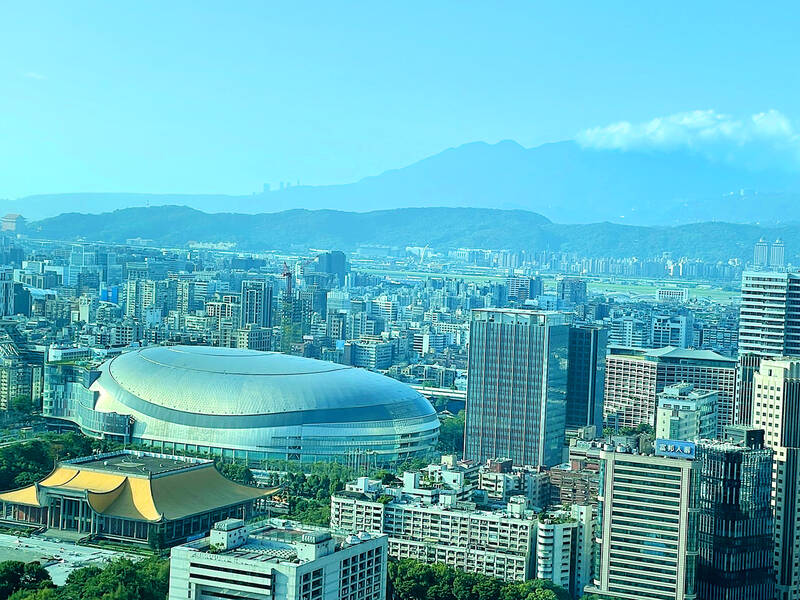Property transactions last month totaled 18,565 units in Taiwan’s six special municipalities, representing an increase of 8.6 percent from October, as builders wrapped up construction and turned over ownership to buyers ahead of the year’s end, brokers said.
However, the volume represents a 28.5 percent plunge from November last year, as interest rate hikes and economic uncertainty slowed purchase decisions.
Construction on presale housing projects in Taipei, Taoyuan, Taichung and Kaohsiung were completed and delivered, bolstering the number of deals to 1,999 units, 3,724 units, 4,286 units and 2,708 units respectively, Evertrust Rehouse Co (永慶房屋) deputy research manager Chen Chin-ping (陳金萍) said.

Photo: Hsu Yi-ping, Taipei Times
Property transfers in New Taipei City reported a 10 percent rise to 4,238 units, and shrank 0.7 percent to 1,610 units in Tainan, Chen added.
Taiwanese developers often aim to complete projects by the year’s end to meet buyers’ needs and strengthen annual financial statements.
The housing market has not been spared from an economic slowdown in Taiwan and heightened fear of recession in the US and Europe, where central banks are raising interest rates to tame inflation despite job losses and economic downturns.
Transactions in the first 11 months of this year fell 7 percent from a year earlier, and the pace of retreat has been widening each month, Chen said.
The decline is set to persist in light of growing mortgage burdens, softening GDP growth and a negative wealth effect linked to TAIEX corrections, Chen said.
Taiwan’s central bank has hiked interest rates three times this year and is widely believed to make another increase later this month.
The decline is most evident in Kaohsiung and Tainan at 14.3 percent and 12.4 percent respectively, Great Home Realty Co (大家房屋) lead researcher Mandy Lang (郎美囡) said, but added that it is partly due to a high base last year.
The housing market in southern Taiwan enjoyed a two-year boom on the back of investment and expansion plans of local chipmakers and international equipment suppliers.
The property fever subsided after local tech firms cut and postponed capital spending due to order cancelations and sluggish end-market demand, Lang said.
H&B Business Group (住商不動產) research director Jessica Hsu (徐佳馨) said the lack of consensus over house prices have also dragged transactions.
Large developers have deep pockets and tend to hold firm on prices, as this strategy has paid off in the past, Hsu said.

NEW IDENTITY: Known for its software, India has expanded into hardware, with its semiconductor industry growing from US$38bn in 2023 to US$45bn to US$50bn India on Saturday inaugurated its first semiconductor assembly and test facility, a milestone in the government’s push to reduce dependence on foreign chipmakers and stake a claim in a sector dominated by China. Indian Prime Minister Narendra Modi opened US firm Micron Technology Inc’s semiconductor assembly, test and packaging unit in his home state of Gujarat, hailing the “dawn of a new era” for India’s technology ambitions. “When young Indians look back in the future, they will see this decade as the turning point in our tech future,” Modi told the event, which was broadcast on his YouTube channel. The plant would convert

‘SEISMIC SHIFT’: The researcher forecast there would be about 1.1 billion mobile shipments this year, down from 1.26 billion the prior year and erasing years of gains The global smartphone market is expected to contract 12.9 percent this year due to the unprecedented memorychip shortage, marking “a crisis like no other,” researcher International Data Corp (IDC) said. The new forecast, a dramatic revision down from earlier estimates, gives the latest accounting of the ongoing memory crunch that is affecting every corner of the electronics industry. The demand for advanced memory to power artificial intelligence (AI) tasks has drained global supply until well into next year and jeopardizes the business model of many smartphone makers. IDC forecast about 1.1 billion mobile shipments this year, down from 1.26 billion the prior

People stand in a Pokemon store in Tokyo on Thursday. One of the world highest-grossing franchises is celebrated its 30th anniversary yesterday.

Zimbabwe’s ban on raw lithium exports is forcing Chinese miners to rethink their strategy, speeding up plans to process the metal locally instead of shipping it to China’s vast rechargeable battery industry. The country is Africa’s largest lithium producer and has one of the world’s largest reserves, according to the US Geological Survey (USGS). Zimbabwe already banned the export of lithium ore in 2022 and last year announced it would halt exports of lithium concentrates from January next year. However, on Wednesday it imposed the ban with immediate effect, leaving unclear what the lithium mining sector would do in the